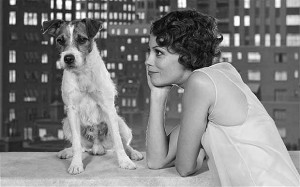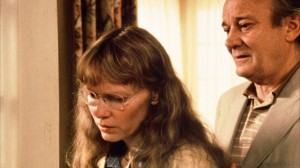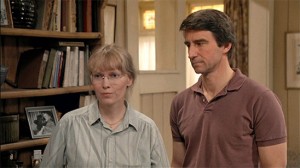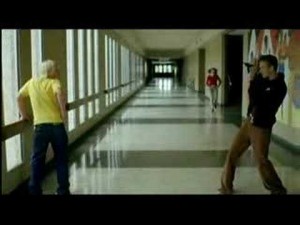From the Chicago Reader (November 7, 2003). — J.R.
Elephant
**** (Masterpiece)
Directed and written by Gus Van Sant
With Alex Frost, Eric Deulen, John Robinson, Elias McConnell, Jordan Taylor, Carrie Finklea, Nicole George, Brittany Mountain, Bennie Dixon, Nathan Tyson, Alicia Miles, Kristen Hicks, Timothy Bottoms, and Matt Malloy.

Gus Van Sant’s startling and brilliant Elephant — a film that follows the activities of several high school students before and during a massacre like the one at Columbine — has its flaws, yet its virtues so outshine them that the years he’s spent lost in the wilderness can be forgiven. His four previous features weren’t exactly dead on arrival, though his 1998 remake of Psycho came alarmingly close. But the filmmaker responsible for such fresh early shorts as The Discipline of DE (1978) and My New Friend (1987) and such exciting early features as Mala Noche (1985), Drugstore Cowboy (1989), and My Own Private Idaho (1990) was almost nowhere in evidence in Good Will Hunting (1997), Psycho, or Finding Forrester (2000) and only faintly discernible in the experimental feature Gerry (2001). (In between were two satirical features, the uneven 1993 Even Cowgirls Get the Blues and the more successful 1995 To Die For.) Read more
Okay, even though I’ve refused to place The Artist on any of my lists of end-of-the-year favorites, I’ve just finished reseeing it, and I have to admit that if I were a member of the Academy and could offer write-ins, Uggie the dog would be somewhere near the top.

Let’s be frank: we all have different thresholds when it comes to shameless bids for our affection, and these thresholds are invariably matters of taste. While I haven’t been able to forgive The Artist for pilfering and then brandishing a sizable chunk of Bernard Herrmann’s Vertigo score near its closing stretches to impart a sense of tragedy — even after I’ve forgiven Michel Hazanavicius for all his other outrageous breaches of period and silent movie syntax (in short, his diverse and mutifaceted ahistorical outrages), not to mention his abject appropriations of diverse narrative chunks from Singin’ in the Rain, A Star is Born, and Citizen Kane — I’m still periodically won over by some of his audiovisual ideas as acts of audacity and stylistic flourishes in their own right.
Above all, I’m flabbergasted by the performance of Uggie the dog, mutt extraordinaire, which has got to be one of the best canine turns in the history of cinema. Read more
From the Chicago Reader (December 1, 1987). — J.R.


Woody Allen’s worst film and second pure noncomedy — a desperate low-energy recycling operation — features four (or, arguably, five) cases of unrequited love among six characters stagebound in a New England summer house for about 18 hours: a suicidal depressive (Mia Farrow), loved by both her flamboyant mother (Elaine Stritch) and a middle-aged widower (Denholm Elliott), loves only an unfulfilled writer (Sam Waterston), who loves only the suicidal depressive’s best friend (Dianne Wiest), who doesn’t know who or what she wants. To add a little contrast, the mother is happily married to a physicist (Jack Warden), but just to make sure that we don’t jump to any wrong conclusions about this, the latter imparts to us the helpful wisdom that the meaninglessness of the universe is more depressing than the threat of nuclear annihilation (perhaps the key to Woody’s no-sweat politics). Wiest remarks at another point that she’s married to a radiologist, but she won’t let him x-ray her because she doesn’t want him to know what’s inside her. Most of the writing is on this glib and wretched level, and the laws of diminishing returns and what James Agee once called rigor artis set in with a stultifying vengeance. Read more





